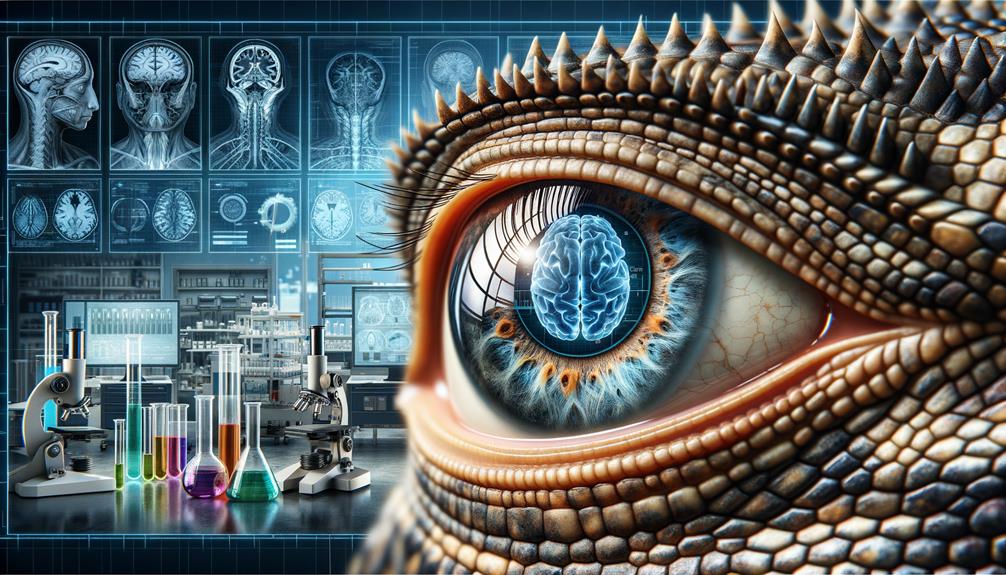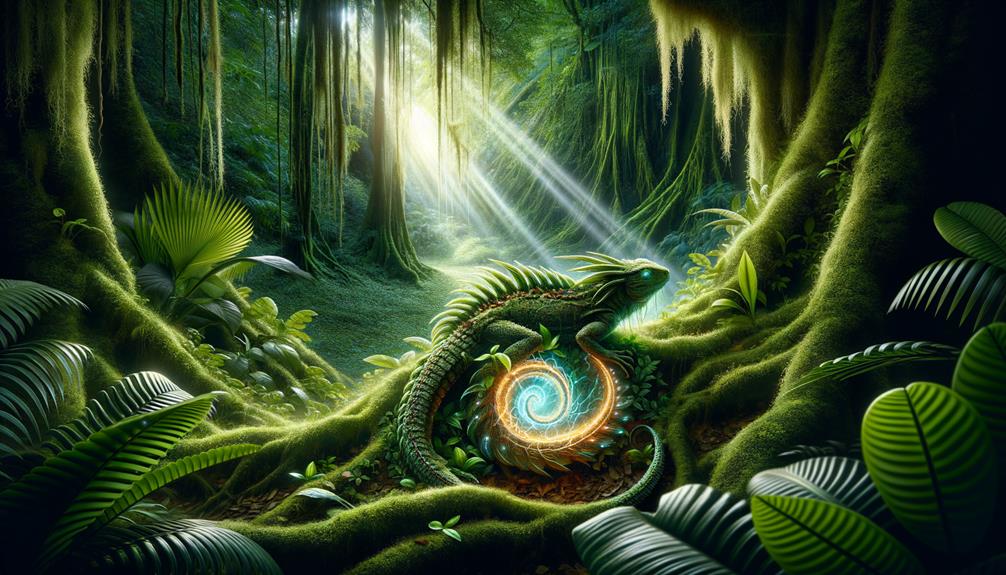Recent studies suggest reptiles have more complex **emotional lives** than previously thought. While they don't express feelings like mammals or birds, researchers have observed signs of fear, anxiety, and stress in reptiles through changes in heart rate and behavior. The presence of similar brain structures across species points to a shared evolutionary background for these emotional responses.
Despite lacking a neocortex, reptiles show social behaviors, form preferences, and thrive in stimulating environments. This challenges old assumptions about their cognitive abilities and emotional capacity.
Interestingly, the idea of reptiles as emotional support animals is gaining traction. As our understanding of reptile psychology grows, we're uncovering new insights that could reshape how we view these creatures.
The field of reptile emotions is still young, but it's already pushing us to reconsider long-held beliefs. As research continues, we're likely to learn even more about the inner lives of these fascinating animals.
Understanding Reptile Emotions
Reptiles aren't known for their expressive faces or vocal range, but that doesn't mean they lack feelings. Recent studies suggest these scaly creatures experience a variety of emotions, much like their furry and feathered counterparts. Snakes, for instance, can form preferences for certain handlers, while iguanas display distinct personalities and social behaviors. These findings hint at reptiles' ability to form emotional connections, albeit in ways that differ from more animated animals.
Digging into reptile emotions isn't straightforward. Their unique nervous systems and brain structures make it tough to measure and interpret their responses. But new research in animal cognition and neuroscience is shedding light on how these creatures perceive their world. Providing stimulating environments for reptiles can reduce stress and boost their overall health, suggesting they have emotional needs similar to mammals and birds. While they may not match the emotional complexity of some animals, it's clear that reptiles have feelings that impact their quality of life.
Scientists face hurdles in studying reptile emotions, but the field is progressing. As we learn more about how these animals experience their surroundings, we're better equipped to care for them. Creating enriching habitats and offering engaging activities can make a real difference in a reptile's well-being. This growing understanding challenges old notions about cold-blooded creatures and opens up new avenues for research and animal welfare.
Scientific Evidence

Recent research challenges old ideas about reptiles' feelings and smarts. Scientists have found that these animals can feel scared, anxious, and stressed. We can measure these emotions by checking their heart rates, hormone levels, and how they act – like running away or getting aggressive.
Reptile brains have parts similar to mammals, including structures that handle emotions. This suggests our feelings might come from the same evolutionary roots. Tests show reptiles can learn, solve problems, and even play, hinting at a richer emotional life than we thought.
We're also learning about how reptiles interact socially. They can recognize others of their kind and some even show affection to their human caretakers. Brain scans are giving us more info about what's going on in reptile minds.
All this research is painting a new picture of reptiles as creatures with real emotions, quite different from what we used to think. It turns out these scaly animals might be feeling a lot more than we gave them credit for.
Comparing Reptiles and Mammals

Reptiles and mammals differ greatly in their brain structures and how they respond to their environment. The absence of a neocortex in reptiles, a brain region crucial for complex emotions and decision-making in mammals, leads to significant behavioral differences.
Key distinctions include:
- Brain Makeup: Mammals have a larger cerebral cortex relative to their brain size, while reptiles rely more on their sense of smell, suggesting a stronger dependence on instinct and sensory input.
- Stress Responses: Reptiles exhibit a more pronounced fight-or-flight reaction controlled by the brainstem and cerebellum. In contrast, mammals process emotions through a more developed amygdala and prefrontal cortex.
- Group Dynamics: Mammals show intricate social behaviors and bonding, facilitated by brain chemicals like oxytocin, dopamine, and serotonin. These are largely absent in reptiles.
- Non-verbal Communication: Mammals use facial muscles and whiskers to convey emotions, a ability reptiles lack due to their simpler neurological and anatomical makeup.
These contrasts underscore how differently reptiles and mammals experience and express themselves. While reptiles can learn and tackle problems, their thinking abilities and emotional responses are generally less nuanced and adaptable than those of mammals. Grasping these differences helps us appreciate the unique ways each group interacts with their surroundings and each other.
Emotional Support Reptiles

Reptiles, despite their simpler brain structures, can offer genuine emotional support in therapy settings. I've seen firsthand how these often-misunderstood creatures bring comfort to people. While they might not show emotions like mammals do, their presence alone can be calming. Many find it soothing to hold a bearded dragon or snake, which can help them feel grounded.
The key to understanding this lies in the steady, predictable interactions reptiles offer. Caring for these animals can give people a sense of purpose and routine, which is helpful for those struggling with mental health issues like anxiety or depression.
Reptiles don't judge, which allows people to form bonds without worrying about complex emotions. This can be especially valuable for those who find human relationships challenging. While we need more studies to fully grasp how reptiles help in therapy, it's clear they're changing our ideas about what makes a good support animal.
These scaly companions challenge traditional views on therapy pets, proving that emotional support can come in unexpected forms. As we continue to learn about the benefits of reptiles in therapeutic settings, we might see more of them in clinics and counseling offices across the country.
Reptile Welfare

Taking care of reptiles means really getting to know what they need to be healthy and happy. As someone who keeps these scaly pets, I've learned that they have feelings too. They can get stressed out or feel content, and that affects their overall health. It's my job to make sure they have a good home where they can do well.
Some key things to think about for reptile care:
- Home setup: Create a space that feels like where they'd live in nature. Get the temperature and humidity right, and give them places to hide.
- Food: Feed them what's right for their species. If they don't get the right nutrients, it can make them sick and upset.
- Health checks: Keep an eye out for any signs they're not feeling well. Catching problems early is really important.
- Things to do: Give them stuff to interact with in their habitat. It helps them act naturally and feel more secure.
Limitations and Future Research

Studying reptile emotions isn't easy. Scientists face big hurdles when trying to figure out how these creatures feel. We need better ways to measure their reactions without disturbing them. Future work should focus on creating new tools to track reptiles' body signals and behavior.
There's also a lot to learn about how reptile brains process emotions. This could help us understand why some people find comfort in keeping reptiles as pets. It might even lead to new ideas for animal-assisted therapy.
As research moves forward, we might uncover surprising facts about reptile feelings. This could change how we interact with these animals, both in zoos and as pets. It's an exciting field with plenty of room for discovery.
Current Research Gaps
Research on reptile emotions has hit some roadblocks. We're struggling to accurately measure and interpret how these scaly creatures feel. This makes it tough to fully grasp what's going on in their world.
One big issue is our limited knowledge of reptile brains. We need to dig deeper into how their neural systems work to understand their emotional responses better. It's like trying to solve a puzzle with missing pieces.
We also need better ways to assess reptile emotions without causing them stress. Current methods often fall short. Developing new techniques, like improved behavioral observations or non-invasive physiological measures, could be a game-changer.
Another pressing concern is how environmental changes affect reptiles emotionally. As habitats shrink and the climate shifts, we need to understand the impact on their well-being.
Four key areas crying out for more research are:
- Brain function: How do reptile neural systems process emotions?
- New assessment tools: What innovative, stress-free methods can we use to gauge reptile feelings?
- Environmental effects: How do habitat changes influence reptile emotional states?
- Complex emotions: Can reptiles experience feelings like affection, happiness, or empathy?
Lastly, we know little about how effective reptiles are as emotional support animals. More studies are needed to understand their impact on mental health and what makes them suitable for this role.
Methodological Challenges
Researching emotions in reptiles is no walk in the park. These scaly creatures don't wear their hearts on their sleeves like mammals do. They don't give us puppy dog eyes or purr when they're happy. This makes it tough to figure out what's going on in their heads.
Scientists have to get creative. They use roundabout methods like watching what reptiles choose when given options or what they seem to prefer. But these approaches have their limits and need careful analysis.
Another headache is the lack of consistent testing methods. Reptiles are a diverse bunch, and their behavior can change depending on the situation. This makes it hard to compare studies or draw broad conclusions.
Our limited grasp of reptile thinking and behavior adds to the confusion. Emotions are tricky to pin down at the best of times, and with reptiles, it's like trying to solve a puzzle in the dark.
Looking ahead, researchers need to develop clever, species-specific ways to measure emotional responses. They might track physical signs like heart rate or skin changes. Long-term studies comparing different reptile species could shed light on how emotions evolved in these ancient animals. It's a tall order, but the payoff could be huge in understanding our scaly friends better.
Potential Study Areas
Researchers face hurdles in understanding reptile emotions, but several promising areas of study could fill the knowledge gaps. These research directions could improve our scientific understanding and lead to better conservation and welfare practices for reptiles.
Brain function and chemical messengers: Looking into how reptile brains process emotions and what chemicals are involved could show us how similar or different they are to mammals and birds. This might involve studying chemicals like dopamine and serotonin, which play roles in mood and behavior.
Environmental factors: Examining how reptiles react emotionally to things like temperature and light could offer insights into their needs. This knowledge could help create better living spaces for captive reptiles and inform efforts to protect wild habitats.
Thinking and feeling: Investigating how reptiles think might reveal more about their emotional range. Comparing reptiles to other animals could uncover shared emotional patterns across different species.
Group dynamics and signals: Observing how reptiles interact and communicate with each other might hint at their emotional experiences. This could be especially important for understanding social reptile species and meeting their welfare needs.
Frequently Asked Questions
Do Reptiles Have Emotional Feelings?
I've been looking into the question of whether reptiles experience emotions. The research indicates that while these cold-blooded creatures react to their environment, they don't have the same range of feelings as mammals do. Their actions are mostly based on survival instincts rather than complex emotions.
Scientists have found that reptiles' brains are wired differently from those of mammals. They lack certain structures associated with emotional processing. This doesn't mean reptiles are completely unfeeling, but their responses are more basic and tied to immediate needs.
For example, a lizard might appear to show fear when confronted by a predator, but this is likely an automatic survival response rather than a conscious emotional experience. Similarly, what might look like affection in a pet snake is often just a reaction to warmth or the promise of food.
It's important to note that our understanding of animal cognition is always evolving. While current evidence suggests reptiles don't have emotional feelings in the way we understand them, future research could reveal more nuanced insights into their mental states.
What Are the Emotions of a Reptilian?
Reptiles' emotional lives remain a mystery to scientists. While they display behaviors linked to survival, like stress responses and aggressive actions, it's hard to say if they feel emotions the way mammals do. Researchers continue to debate whether reptiles experience deeper feelings beyond basic instincts. The scientific community hasn't reached a consensus on this complex topic, leaving many questions unanswered about the inner world of these scaly creatures.
What Are the Emotional Intelligence of Reptiles?
Reptiles can show basic feelings like fear and aggression, but their emotional range isn't as wide as mammals. They don't form complex social ties or show much empathy. While they react to their environment, their emotional responses are more limited compared to animals like dogs or cats. This doesn't mean reptiles are emotionless; they just process and express feelings differently. Their simpler brain structure influences how they interact with their surroundings and other creatures. Understanding these differences helps us care for reptiles properly and set realistic expectations about their behavior.
How Do Reptiles Express Happiness?
Watching reptiles, you might notice they show contentment in subtle ways. They'll often stretch out to soak up some sun, close their eyes slowly, or move about with a relaxed demeanor. My iguana seems to recognize me when I come around, which could be a sign of fondness. It's quite something, having a pet that's basically a miniature version of an ancient creature!



